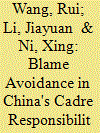| Srl | Item |
| 1 |
ID:
181136


|
|
|
|
|
| Summary/Abstract |
This article contends that prior research on the behaviour of Chinese local cadres pays limited attention to their motivation for avoiding blame. Using qualitative data from three field studies conducted in Guangdong province, the study focuses on blame avoidance in the cadre responsibility system, which is recognized as an important instrument for state capacity building. Our analysis uncovers three major discursive strategies used by grassroots cadres to manage blame either before or after it is apportioned: de-legitimating performance standards, re-attributing blame and transferring blame risk. We find that local cadres have a role as blame makers in shifting blame and accusations. This finding challenges the conventional view, which typically sees local officials as blame takers. The article concludes by elaborating on the wider implications of this finding and proposing avenues for future research.
|
|
|
|
|
|
|
|
|
|
|
|
|
|
|
|
| 2 |
ID:
102560


|
|
|
|
|
| Publication |
2011.
|
| Summary/Abstract |
This article challenges the dominant assumptions in the literature that cutting social policy incurs voter wrath and that political parties can efficiently internalise electoral fallout with blame avoidance strategies. Drawing on the diverse literature on the role of partisanship in the period of permanent austerity, several partisan hypotheses on the relationship between social policy change and electoral outcomes are posited. The results indicate that religious and liberal parties gain votes, and thereby are able to 'claim credit', for retrenching social policy. None of the other coefficients for the effect of social policy cuts reach significance, raising the question of whether parties excel at blame avoidance or the public fails to place blame in the first place.
|
|
|
|
|
|
|
|
|
|
|
|
|
|
|
|
| 3 |
ID:
189065


|
|
|
|
|
| Summary/Abstract |
Based on questionnaire data of 1,298 grassroots civil servants in China, this study empirically tests the relationship between the risks perceived to be attached to accountability and the blame avoidance tendency to assess the impact of intensive accountability mechanisms adopted in China's early stages of COVID-19 (coronavirus disease 2019) containment. It is found that intensive accountability may increase the blame avoidance tendency of grassroots civil servants and, by inhibiting the public service motivation, have a negative moderating effect. Prudent accountability and positive incentives are recommended for long-term COVID-19 containment in China.
|
|
|
|
|
|
|
|
|
|
|
|
|
|
|
|